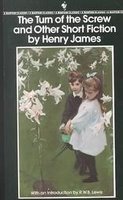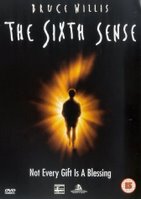
I've lately been so busy, juggling so many things at the same time. I just hope this new year I will be freer and have more time to write this blog. Wish me luck!
Despite the bomb blasts, Bangkok is a lovely and quiet place to stay during major festivals, such as the New Year and Songkran. Most people flee and flock together elsewhere and Bangkok, with its empty roads, becomes a heaven.
I did see the film The Others (2001) a couple of weeks ago but I didn't have time to write a review until today. Imagine I need to keep the whole story inside my head for two weeks before penning it. The film has many layers and it can be viewed in intertextual ways. Let me show you how many ways it can be read.
Intertext I: The Turn of the Screw
 The film, directed by Alejandro Amenabar, resembles one of Henry James's novella, The Turn of the Screw, as both narratives centre around a woman and two children. In James's narrative, the woman is a governess entrusted by a mysterious man to take care of two kids, whereas in The Others, the woman, played by Nicole Kidman, is an actual mother of the two kids, Nicolas and Anne.
The film, directed by Alejandro Amenabar, resembles one of Henry James's novella, The Turn of the Screw, as both narratives centre around a woman and two children. In James's narrative, the woman is a governess entrusted by a mysterious man to take care of two kids, whereas in The Others, the woman, played by Nicole Kidman, is an actual mother of the two kids, Nicolas and Anne.If we relate the film to James's narrative, we can see that the film actually goes a bit further than James's narrative that stops short at the death of the boy, Miles, on the lap of the governess and we simply don't know whether the evil is actually real or the work of imagination. Tzvetan Todorov would use this suspension to mark the genre of the fantastic.
However, in The Others, not only the boy dies, but his whole family, including his sister and his mother. But they do not know that they die. It turns out that the whole thing is turned upside down: they are in fact 'the others', whom the living do not want. By resorting to such a supernatural ending, Todorov would call this film the marvellous and lump this film along with other horror flicks and fantasy films like The Adventures of Harry Potter, The Unseeable, and Silent Hill.
If James's narrative is set in the early twentieth century or late nineteenth century, it is because it is the period of social change, when victorianism was being replaced by more modern ways of life and scientific ways of thinking. By contrast, The Others is set during the WWII, and the sense of insecurity and confusion is engendered mainly through a perspective of a family living in the difficult time of war.
Intertext II: The Sixth Sense
 However, to understand The Others fully, we also need to relate to another film, The Sixth Sense (1999), directed by M. Night Shyalaman. Both films have a surprise ending, all having to do with a shift in perspective. Normally it's the ghost that comes to haunt people, to make people scared. But these two films are different in that they're mainly from the point of view of the ghosts themselves, that even the ghosts are in deep trouble, not knowing what or who they are. In The Sixth Sense, it's Doctor Malcolm Crowe who does not realise that he's dead, and in The Others it's the whole family who never learns to accept the truth that they're dead.
However, to understand The Others fully, we also need to relate to another film, The Sixth Sense (1999), directed by M. Night Shyalaman. Both films have a surprise ending, all having to do with a shift in perspective. Normally it's the ghost that comes to haunt people, to make people scared. But these two films are different in that they're mainly from the point of view of the ghosts themselves, that even the ghosts are in deep trouble, not knowing what or who they are. In The Sixth Sense, it's Doctor Malcolm Crowe who does not realise that he's dead, and in The Others it's the whole family who never learns to accept the truth that they're dead.It is this ingenious twist that makes the two films interesting. In our postmodern age, we are more ready than ever to be liberal and try to look at things from many perspectives. This time it's the ghost who receives the honour. Both directors interpret the ghosts in an anthropomorphic way, making ghosts resemble humans, the only difference being that they are immaterial. Ghosts still yearn and desire, like humans. They will leave the earth once they can accept the truth that they're dead and learn to let go of their worldly concerns. Quite a Buddhist belief, don't you think?
However, it is my personal belief that both films can be considered to approach the genre of magical realism, in that it signals an attempt to understand the psychology of ghosts and use the framework of the living to grasp the condition of the dead. Perhaps the day will come when we finally take ghosts as a common reality, no longer alienating them by imposing on them some spooky elements like protruding tongues and cold presence. Both The Sixth Sense and The Others can then be read as a critique of horror flicks that try to scare viewers by making ghosts look disgusting and ugly. Ghosts have a heart also, you know, and they can be alienated by us, the living, who try to turn them into well a ghostly presence, neither living nor dead, an in-between that, both Jacques Derrida and Homi Bhabha would argue, terrorises us.

1 comment:
You've excelled yourself this time - not only giving away the ending of the film you're reviewing (The Others), but also giving away the major twist in The 6th Sense as well.
If these films are as interesting as you write (and they are), people may want to see them for themselves. Don't spoil it for them. :-)
Post a Comment